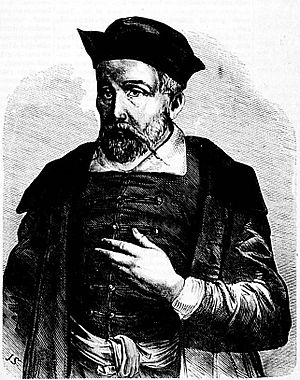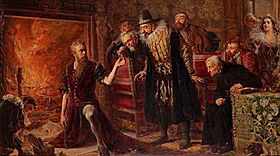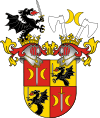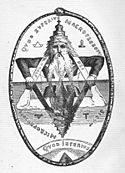Michael Sendivogius facts for kids
Quick facts for kids
Michael Sendivogius
|
|
|---|---|
 |
|
| Born | 2 February 1566 Łukowica, Kingdom of Poland
|
| Died | 1636 (aged 69–70) Kravaře, Holy Roman Empire
|
| Nationality | Polish |
| Other names | Michael Sendivogius, Sędzimir |
| Alma mater | University of Vienna, University of Altdorf, University of Leipzig, University of Cambridge |
| Occupation | Alchemist, philosopher, writer, and medical doctor |
| Known for | The concept of central nitre |
Michael Sendivogius (born Michał Sędziwój; 1566–1636) was a famous Polish alchemist, thinker, and doctor. He was a very early expert in chemistry.
Sendivogius found ways to make different acids and metals pure. He also created other chemical compounds. He discovered that air is not just one thing. He found it contains a special substance that helps living things. This substance was later called oxygen. He figured this out about 170 years before oxygen was officially discovered!
He called this important substance the 'food of life'. He knew it was the same gas that comes from heating nitre (saltpetre). This 'central nitre' was a very important idea in how Sendivogius saw the world.
Contents
Who Was Michael Sendivogius?

We don't know much about Michael Sendivogius's early life. He was born into a noble family. His father sent him to study at the University of Kraków.
Sendivogius also traveled a lot. He visited many European countries and universities. He studied at Vienna, Altdorf, Leipzig, and Cambridge.
Friends and Royal Connections
He met famous people like John Dee and Edward Kelley. Thanks to Sendivogius, King Stefan Batory agreed to pay for their experiments.
In the 1590s, Sendivogius worked in Prague. He was at the court of Emperor Rudolf II. This court was known for being very open to new ideas.
Around 1600, he came to the court of King Sigismund III Vasa in Poland. He quickly became very famous. The Polish king loved alchemy too and even did experiments with Sendivogius.
In Kraków's Wawel castle, you can still see the room where they did their experiments.
Later Life and Work
Sendivogius also helped with practical things. He designed mines and metal foundries (places where metal is melted and shaped). Because he knew so many people around the world, he also worked as a diplomat from about 1600.
Later in his life, Michael Sendivogius spent more time in Bohemia and Moravia (now part of the Czech Republic). The emperor gave him land there. Near the end of his life, he lived in Prague. He became even more famous for designing mines and foundries.
However, a big war called the Thirty Years' War (1618-1648) changed everything. Rich people started spending their money on the war instead of on science. Sendivogius died without much attention.
Sendivogius's Books and Ideas
A writer named Daniel Stolcius praised Sendivogius in 1624. He said Sendivogius wrote twelve books.
The most famous book was "New Chemical Light," published in 1604. This book clearly explained his idea about the 'food of life' (oxygen) in the air. His books also had many scientific and philosophical ideas. People like Isaac Newton read and studied his books for a long time.
Sendivogius in Stories and Art
Michael Sendivogius has appeared in many stories. The first time was in 1845, in a book called Sędziwoj by Józef Bohdan Dziekoński.
In the early 2000s, he was a character in several books by Polish writer Andrzej Pilipiuk. These books include Kuzynki (2003), Księżniczka (2004), and Dziedziczki (2005).
He also appears in a novel by Gustav Meyrink. Meyrink was a German author from Prague who often wrote about alchemy.
The famous Polish painter Jan Matejko painted a picture of Sendivogius. It shows him turning a common metal into gold in front of King Sigismund III Vasa.
In the 1980s, Sendivogius was also shown in a Polish TV series. He was called the Alchemist Sendivogius.
See also
 In Spanish: Michał Sędziwój para niños
In Spanish: Michał Sędziwój para niños
 | James Van Der Zee |
 | Alma Thomas |
 | Ellis Wilson |
 | Margaret Taylor-Burroughs |



